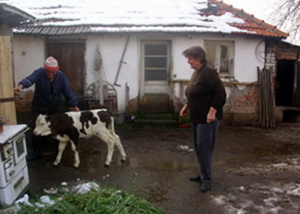As a consequence of wars at the territory of former SFRY, hundred thousands refugees came to Serbia in 1990s. A new expulsion of Serbs from Kosovo and Metohija ensued after the NATO bombing. The poorest refugees and displaced persons still live in hardest conditions. According to the data of the PRS as much as 25% of refugees and displaced persons live below the poverty line. Collective centers are closed down, and in harmony with possibilities of the country they are motivated to become independent in Serbia or to return to the place of they were expelled from.
The Gunj family was first expelled from the Klokoc village, in the Croatian municipality of Vojnic. Mile and Milka Gunj joined the convoy of thousands of Serbs in 1995 headed to their parent country, together with their children Nikola and Vesna and their elderly parents. They lived in Gnjilane in Kosmet by 1999. They arrived to Leskovac village, near Kragujevac with nothing more than property in one bag.
Thanks to the loans of the Microdeveloment Fund, the Gunj family have regular income today, they fight poverty more easily and they look forward to better weather in order to start building their house.
The Microdevelopment Fund is an NGO helping improve the living standards of the poor and economic-wise active population of Serbia.
„We have taken the loans in order to start living better. We couldn’t take a loan from banks because we don’t own any property. We are thus working hard to pay for the installments, and now we are hoping for the construction of a house”, says Milka Gunj.
With the aim of ensuring sustainable financing of poor entrepreneurs with no access to formal banking market, the Fund offers microcrediting programs aimed at empowering and improving the living standards of the poor population.
Present in 18 municipalities of the Central and Southern Serbia since 2001, the Fund has issued 10,583 loans to its clients – refugees and displaced persons, local entrepreneurs, the unemployed, business returnees and women. The value of 1,283 loans from the first nine months in 2007 amounted to EUR 2,284,920. An average loan amounts to EUR 1,864, and the number of installments is – 21 months. Donors involved are UNHCR, DANIDA – Danish Government, ICRC, Tavolo Trenito, UN Habitat.
The staff of the Health Center are worried what shall happen after May. They are hoping for a new donor, as are the members of the team. Namely, the six workers were unemployed until the project began. They were engaged through the National Employment Service who took part in the project.
They made 1,800 visits in the course of 12 months, or five to seven visits on a daily basis of one of the 36 patients. The calculation indicates that costs, in comparison to other means of assisting the elderly, are the smallest – only RSD 4,400 per patient per month. Gerontology services of the Gerontological Centar cost RSD 9,000, while the stationary care amounts to RSD 23,792. The private homes charge several hundred euros for a monthly stay.
What cannot be measured by money, as the nurse Ana Tanaskovic says, is the happiness of the elderly who did not have a person cross their threshold in a decade.
The example of Obrenovac shows us how the problem of elderly care may be solved, who are among the poorest population. Furthermore, the engagement of nurses, assistants and hygiene attendants decreases the number of the unemployed. Local government contributed by funds for salaries and by drawing attention of the public to the problems of the elderly neglected population.
 Government of the Republic of Serbia
Government of the Republic of Serbia
















 pdf [271 KB]
pdf [271 KB]
Leave a Comment